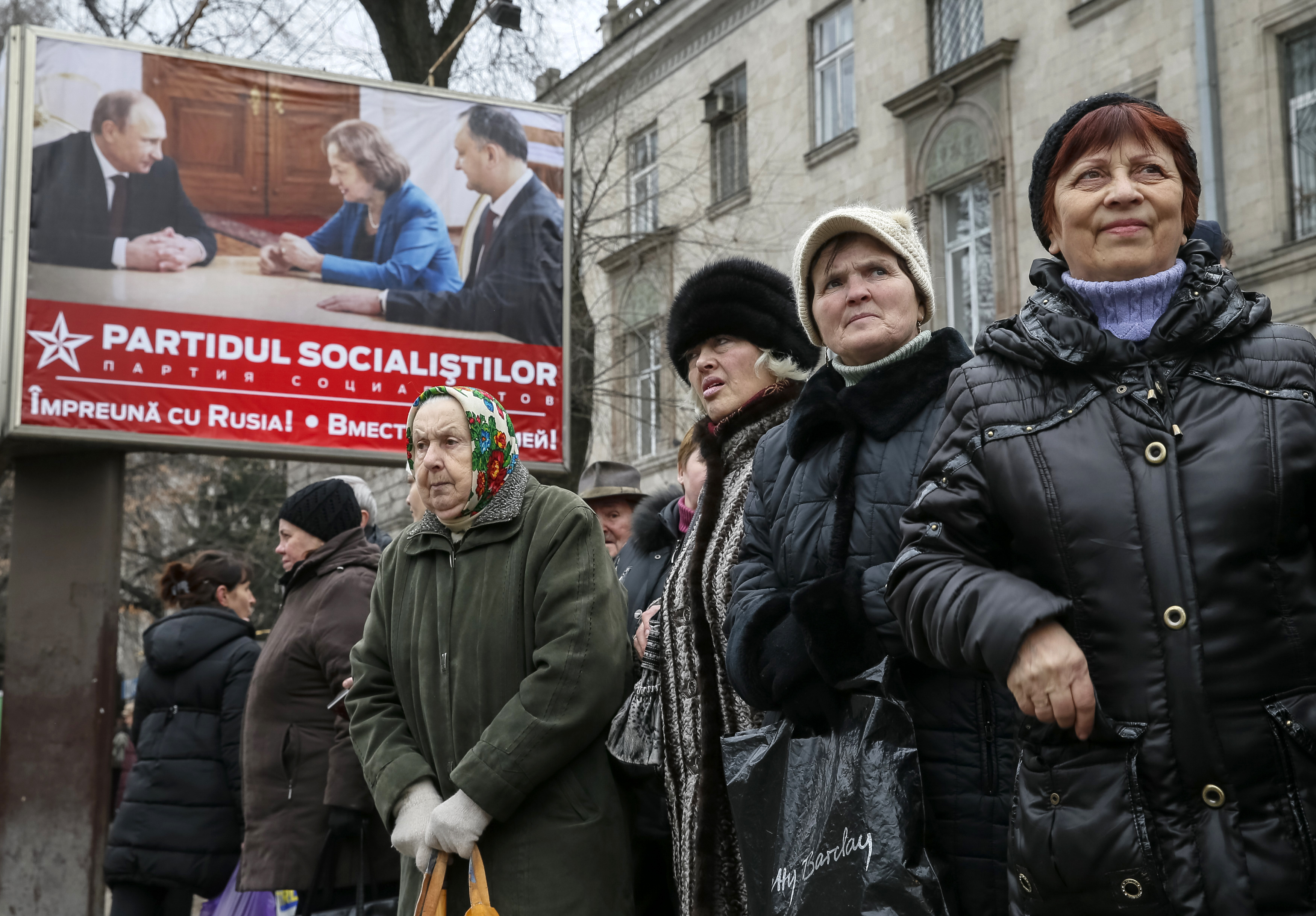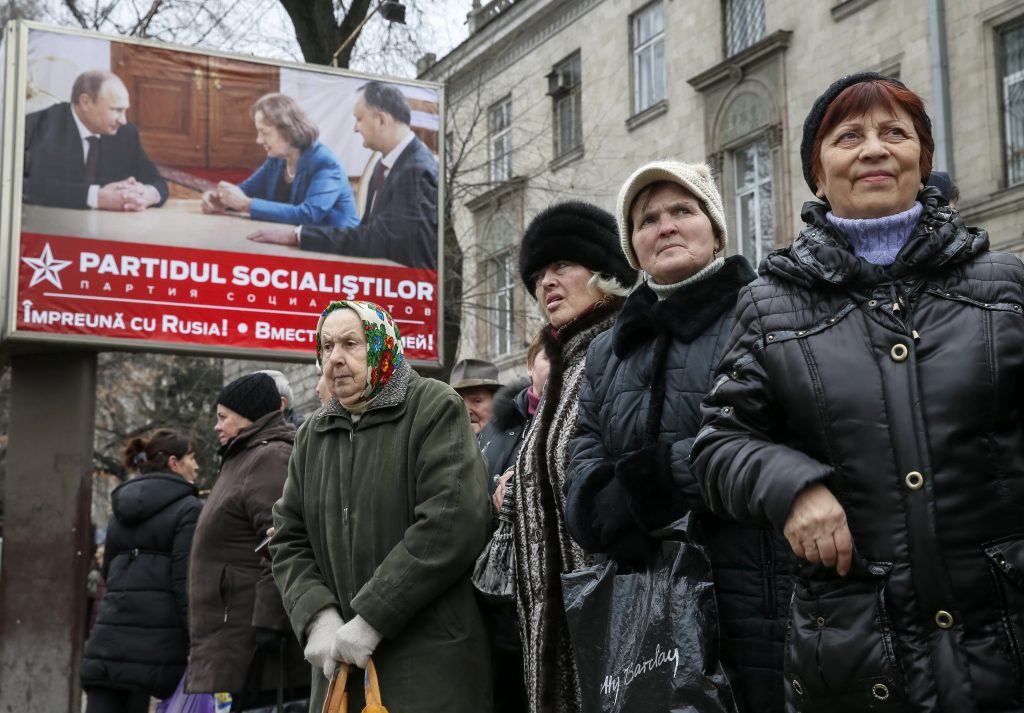
US, EU Should Re-Focus Now on What May Be a Last, Best Chance for Critical Changes, Analysts Say
Moldova’s pro-Europe parties have won a troubled election victory, taking barely enough parliament seats to renew their coalition and pursue the integration of Moldova with the European Union. That may hold open a window of opportunity—for perhaps as little as two years—to bring critical economic and governance reforms on line, analysts say. Delay will risk a deeper erosion of popular support for reforms in Moldova, and political will in Europe to support them.
The election represents a warning that that the government and its transatlantic allies will need to do better—fast—at bringing jobs, income and transparency to Europe’s poorest economy (and one of its most corrupt). Only 56 percent of Moldovans voted, down from 65 percent in the previous parliament election, four years ago. Support for the three pro-Europe parties fell from 52 percent in 2010 to about 46 percent in this vote, narrowing the bloc’s majority to fifty-five of the 101 parliament members. And the biggest vote-getter was the Russian-backed Socialist Party, a fact that will energize the pro-Russian opposition.
While Moldova is overshadowed in public discourse by the Ukraine crisis, it’s a critical piece of the broad conflict over how far Russia is to control the futures of Europe’s former Soviet republics, from the Baltics to the Caucasus. The narrow reelection of Prime Minister Iurie Leanca’s pro-Europe bloc highlights a need “for Moldova’s friends in Europe and the US to combine pressure and support for the new government to ensure that another four years are not wasted with too-tentative steps for change,” Atlantic Council Senior Fellow Sabine Freizer wrote in an e-mailed comment. (See immediate policy recommendations by Freizer and others, below.)
Moldova and Russia
Russia captured Moldova, an ethnic Romanian region, in 1812, fortifying and Russifying it as a border province. Amid World War I, Moldova declared independence and joined Romania in 1917, but the Soviet Union seized it back in World War II. Since Moldova regained independence in the 1991 collapse of the USSR, Russian nationalists and troops have controlled the country’s western region, Transnistria. Russia has used its control of Transnistria, plus economic and political leverage, to pressure Moldova to abandon its efforts to integrate with Europe.
In 2010 the pro-Europe parties won a parliamentary majority, and their government promised deep reforms and an attachment to Europe. The Leanca administration negotiated and signed this year an Association Agreement and a free-trade pact with the European Union, and won visa-free travel for its citizens across Europe. Russia swiftly punished these steps by banning the import of Moldovan farm produce and wines—a serious blow to Moldova’s heavily agrarian economy.
At home, “Moldova is failing in its current leadership’s quest to become European,” the Moldova-based journalist and researcher Vladimir Soloviev wrote in a July report for the London-based Legatum Institute. “The country has yet to escape from Russia’s geopolitical influence or to overcome endemic corruption, or to develop strong public institutions.” The government has lost popular support over its constant infighting and because it has failed to open up competition in an economy still “distorted by monopolies,” Soloviev wrote.
Disenchanted Voters
Disenchanted Moldovan “voters were looking for new faces, and the only new faces came from the pro-Russian parties,” said Oana Serafim, a longtime journalist and director of the Moldovan Service of Radio Free Europe-Radio Liberty. A Russia-based Moldovan businessman, Renato Usatii, 36, formed the Patria (“Fatherland”) party. In part by sponsoring flashy, Russian pop music concerts by Russian pop musicians, Patria quickly rose to hold 10 percent or more of popular support in opinion polls. Last week, a court barred Patria from the election, saying it illegally had received nearly a half-million dollars in foreign funding. Patria’s disqualification will help energize the pro-Russian opposition, Serafim said in an interview at the Atlantic Council. The pro-Russian Communist Party in Moldova has said it will contest the legitimacy of the results.
In the popular vote, the pro-Russian Socialist Party narrow won a plurality and will lead opponents of the government. “This is not a bad place to be in the run-up to presidential elections in 2016, and in opposition to the pro-European coalition, which is likely to suffer various strains that may force its collapse before its full four-year term ends,” Freizer wrote.
“Overall, this election is like a cold shower for the government,” said Serafim. “Let’s see if they’ve understood the message about how unhappy the voters are.” With rising fatigue over Moldova’s crises both for Moldovans and in Europe, a new political window for reform may last about two years, she said, until presidential elections in 2016.
Policy Recommendations for US, EU and Moldova
As the new government takes office, Freizer, Serafim, and other analysts say it and its western allies should move quickly to improve governance, the economy, and Moldovans’ daily lives. The suggestions include these:
- Press for the quick formation of a new cabinet. The US and European governments should press the Liberal-Democratic Party leader and patron, business magnate Vlad Filat, to abstain from seeking advantages for himself or his wealthy friends, which would complicate the formation of a coalition government, Freizer said. “Talks to form the government should be wrapped up before the end of December to let it being quickly to address the challenges that made so many people willing to vote Socialist and Communist” on November 30, she said.
- Moldova and its friends should push for concrete implementation of anti-corruption laws. “Firstly it’s time to take anti-corruption seriously,” according to Freizer. “Moldova this year ranks 103rd out of 175 countries in Transparency International’s Corruption Perception Index. And pre-election polls showed that corruption was the top concern for 32 percent of Moldovans … second only to the 34 percent worried most about unemployment.” She added: “International donors and investors have pushed Ukraine hard to focus on fighting corruption; Moldova should be no different.”
- Europe should quickly offer to help Moldova train its judges—a critical step against corruption. While the Leanca government has passed anti-corruption laws, notably establishing a National Anti-Corruption Center, Moldova lacks the truly independent and professional judiciary that is necessary to implement and enforce anti-corruption laws, Serafim and other analysts say. “Europe could help by providing judicial experts to provide training in Moldova in a way similar to the EULEX project to strengthen the rule of law in Kosovo,” Serafim said. That European Union project encompasses 1,600 staff members who train, mentor and support the government’s judicial system—and Moldovan President Nicolae Timofti has called for European help with Moldova’s own judicial reforms.
- Moldova should offer cultural concessions to reduce opposition among ethnic minorities. Russia has targeted Moldova’s ethnic Russians, Bulgarians and Turkic-speaking Gagauz minorities with propaganda, alleging that Moldova’s European integration will lead obliterate their rights and their communities. In particular, the leadership of the autonomous Gagauz region has built a potentially dangerous Gagauz antipathy toward the government, several analysts say. But in their eagerness to curry support from Moscow, Gagauz leaders have neglected the Gagauz’ real concerns, according to an account by Eurasia analyst Paul Goble. The Moldovan government might marginalize those pro-Russian leaders by offering “a genuine cultural deal” with the Gagauz community, including support for Gagauz-language schools, Goble wrote in a September blog post.
- Moldova should accelerate a decentralization of government. “Decentralization is another area where Moldova has made tentative progress,” said Freizer. “But it should not shy away from a full reform of territorial-administrative boundaries to ensure more participatory, engaged and transparent government at the local level. Too easily now people blame politicians in Chisinau for inefficient government but responsibility should be more easily distributed throughout the country. A new law on fiscal decentralization will come into force in early 2015.”
James Rupert is an editor at the Atlantic Council.
Image: The day before the November 30 election, Moldovan women wait for a trolley in the capital, Chisinau, beneath a Socialist Party billboard that shows party leaders meeting Russian President Vladimir Putin. "Together with Russia!" the billboard proclaims. (Reuters/Gleb Garanich)
